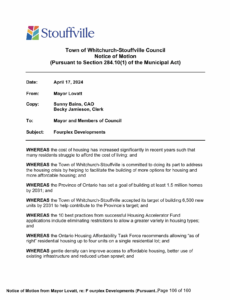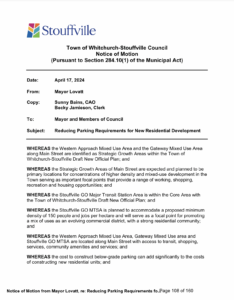
There has been a lot of reaction from the municipal world, especially local Mayors, who are worried about the implications of Bill 23 on municipal finances.
And rightfully so.
Schedule 3 of the legislation amends the Development Charge ACT, 1997 which has the potential to cost the Town of Whitchurch-Stouffville almost $20M over 5 years.
At a special WS council meeting held December 21, 2022, the staff report stated:
4.3 Development Charges Implications
The full financial implications of Bill 23 to the Town of Whitchurch-Stouffville are not yet fully known. As the Town’s current Development Charge (DC) By-law does not expire until December 31, 2023, the financial impact of Bill 23 will not begin until the Town’s new DC By-law is approved, effective January 1, 2024. An initial analysis of the potential financial impacts of the Bill has been completed, based on information known today.
A key change brought forward by Bill 23 is the phasing in of the new DC charges over a five-year period. The DC rates set out in new DC by-laws would be subject to a percentage reduction that gradually decreases each year, over a five-year period. Thus, when the Town approves its’ new DC By-law, only 80% of the charge will be able to be collected in year 1. The full charge will not be collected until year five (5).
Based on the staff forecast for residential units expected over the five-year period (2024-2028) and calculated using the current DC rates, it is estimated that the Town may receive $19.6 million less in revenue than forecast, representing a 13.25% decrease over the five-year period. Table 1 below highlights the estimated lost DC revenue by year and the corresponding capital levy increase that would be necessary to make up the gap.
It is widely known that DC’s help municipalities fund the necessary infrastructure required to develop communities. The funds collected on new development go to support roads, water & wastewater pipes, parks, libraries, fire service and more. They are all essential in building a town or a city and it doesn’t take an MBA grad in finance to realize that removing these necessary funds will only put an untenable burden on the existing tax base.
So the question that remains to be answered is “Will waiving these development charges really make housing more affordable in Ontario?”
With the structure being proposed, the easy answer is no. The general feeling of residents I have spoken with is that the developers will just pocket the money and let the market dictate the price of new homes. This speaks more to the general distrust to the industry than the intention of the province. That’s for another time. Conversely, developers I have had candid conversations with about this issue have unequivocally stated the benefit would be to the new owner. Interesting but how?
In a response letter to AMO’s concerns about the impact of the legislation on its members, Steve Clark, Minister of Municipal Affairs and Housing penned,
“As we undertake this work together, we are committing to ensuring municipalities are kept whole for any impact to their ability to fund housing enabling infrastructure because of Bill 23.”
So if the intent is to keep municipalities whole, then keep us whole.
A POSSIBLE SOLUTION?
I think there could be a simple solution (although, probably more complex than appears) that could achieve the real outcome the province is seeking- more affordability.
Much like when a first time homebuyer buys their principal residence, they could be eligible for an GST/HST rebate. They fill out a government form in their closing documents which is usually submitted by the developer to the federal government and that rebate comes off closing costs to the buyer.
Why not have municipalities collect the DC’s as is customary and required and allow a NEW DC Credit form to be submitted by the developer upon each closing for a direct rebate from the province? This process keeps municipalities whole immediately. There’s no need for municipalities to be involved in the process at all.
This DC Credit, can come off the closing costs to the owner, ensuring the savings are going to the owner as intended and not the developer.
So if a new townhouse in Stouffville is selling for $800 000.00, you can subtract our current DC charge on a townhouse ($51,007 (region) + $22,493 (WS) = $73,500) right off the final bill. Now, that $800K town is $726,500.
That $73,500 is real savings and could go a long way in helping people move towards home ownership.
I fully support the province wanting to make housing more affordable but I don’t see any reason to change DC collections at a local level to achieve their goal.


